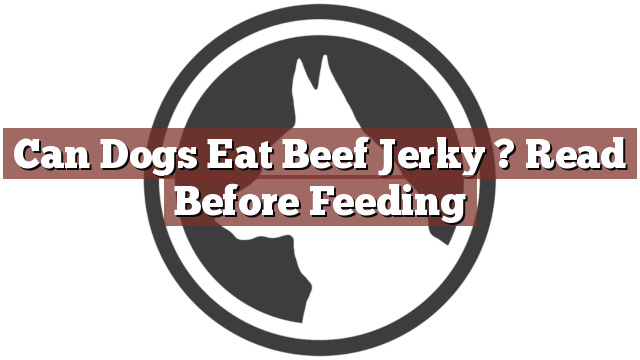Understanding Your Dog’s Dietary Needs
As a responsible pet owner, it is crucial to understand the dietary needs of your furry companion. While dogs are omnivorous animals, they primarily have a carnivorous digestive system. This means that their bodies are designed to process and digest meat more efficiently than plant-based foods. Essential nutrients like proteins and fats are vital for their overall health and well-being. Therefore, it is essential to provide them with a balanced diet that meets their nutritional requirements.
Can Dogs Eat Beef Jerky? Read Before Feeding
Can dogs eat beef jerky? This is a common question among dog owners who are looking for alternative treats or snacks for their pets. The answer is yes, dogs can eat beef jerky, but with caution. Beef jerky is a popular snack made from dried and seasoned beef. While it can be a tasty and convenient treat for humans, it may not be suitable for all dogs.
Pros and Cons of Feeding Beef Jerky to Dogs
There are several pros and cons to consider before offering beef jerky to your furry friend:
Pros:
- High in protein: Beef jerky is packed with protein, which is essential for your dog’s muscle development and repair.
- Long shelf life: Beef jerky has a longer shelf life compared to fresh meat, making it a convenient option for travel or as a training reward.
- Good for dental health: The chewing action required to eat beef jerky can help promote healthy teeth and gums by reducing plaque and tartar buildup.
Cons:
- High in sodium: Most commercially available beef jerky contains high levels of sodium, which can be harmful to dogs, especially those with underlying health conditions such as kidney or heart problems.
- Seasonings and additives: Some beef jerky brands may contain seasonings, spices, or additives like garlic and onion powder, which can be toxic to dogs in large quantities.
- Potential for choking hazards: Beef jerky can be tough and may pose a choking hazard, especially for small dogs or those prone to gulping their food.
In Conclusion: Consider Your Dog’s Health Before Offering Beef Jerky
While dogs can eat beef jerky, it is important to consider your dog’s individual health needs before offering it as a treat. If you decide to feed beef jerky to your dog, opt for low-sodium or homemade versions without any harmful additives. Additionally, always monitor your dog while they are eating beef jerky to prevent choking or any adverse reactions. As with any new food, it is advisable to consult with your veterinarian before introducing beef jerky into your dog’s diet. Remember, the key to a healthy and happy dog is a well-balanced and nutritious diet.
Thank you for taking the time to read through our exploration of [page_title]. As every dog lover knows, our furry friends have unique dietary needs and responses, often varying from one canine to another. This is why it's paramount to approach any changes in their diet with caution and knowledge.
Before introducing any new treats or making alterations to your dog's diet based on our insights, it's crucial to consult with a veterinarian about [page_title]. Their expertise ensures that the choices you make are well-suited to your particular pet's health and well-being.
Even seemingly harmless foods can sometimes lead to allergic reactions or digestive issues, which is why monitoring your dog after introducing any new food item is essential.
The content provided here on [page_title] is crafted with care, thorough research, and a genuine love for dogs. Nevertheless, it serves as a general guideline and should not be considered a substitute for professional veterinary advice.
Always prioritize the expert insights of your veterinarian, and remember that the health and happiness of your furry companion come first.
May your journey with your pet continue to be filled with joy, love, and safe culinary adventures. Happy reading, and even happier snacking for your canine friend!

